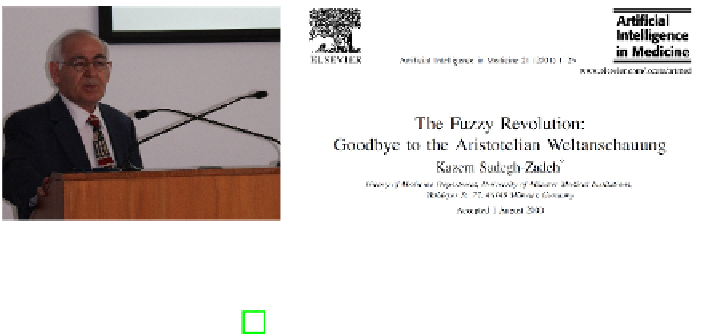Information Technology Reference
In-Depth Information
(a)
(b)
Fig. 3.1
(a): Kazem Sadegh-Zadeh at the
1. International Symposium Fuzziness, Philosophy,
and Medicine
at March 23-24, 2011 at the
European Centre for Soft Computing
in Mieres,
Asturias (Spain); (b) his article [69].
To (A) - (F) Sadegh-Zadeh added the following “concept (G) of logical implica-
tion, consequence, or inference”, that “represents the basic concept of the theory of
deduction and proof underlying all classical mathematics, science, and technology
and he called it “a modern derivative from the Aritotelian logic”:
(G) A set of premises logically implies a conclusion if, and only if, whenever the
premises are true the conclusion is true.
Sadegh-Zadeh characterized the concept of two-valuedness as “responsible not only
for the emergence of individual theories, but for the very mode of scientific thinking
and inquiry in all fields. In that generality we can say that the principles (A)-(F)
together with (G) constitute the 'Aristotelian Weltanschauung' as a general 'world
view' of scientific thinking!
3.1.1
Scientific World Views
Before we will return to this general concept we will consider the more restricted
concepts of world views - “Weltanschauungen” - in science: “thought style” and
“paradigm”. The first was used by the Polish medical scientist and philosopher
Ludwik Fleck (1896-1961) in his 1935 (in German) published book entitled
Genesis
and Development of a Scientific Fact
. This topic is currently regarded as a classic
in history and philosophy of science, but was unknown in most parts of the world
until it was translated into English language in the late 1970s [28]. In this topic
Fleck assumed that sciences grow as living organisms and that the development of a
scientific fact is dependent on specific “styles of thought”. He denied the existence
of any absolute or objective criteria of knowledge; rather, he believed that different
views could be true. He suggested that truth in science is a function of a particular
way of thinking by the “thought collective”, which was the name given to a group
of scientists or persons “exchanging ideas or maintaining intellectual interaction”.

